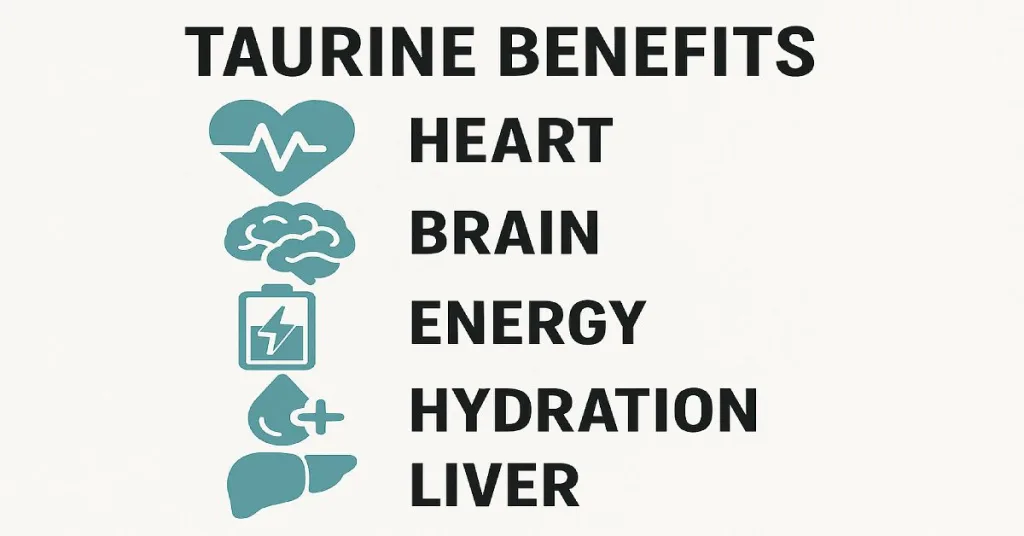What Is Taurine?
Taurine is a sulfur-containing amino acid found abundantly in the heart, brain, retina, and skeletal muscles. Unlike essential amino acids, your body can make small amounts of taurine—but often not enough, especially under stress or illness. That’s why taurine is classified as a “conditionally essential” nutrient: you may need more than your body can produce, depending on your age, diet, and health status.
You’ll commonly see taurine added to energy drinks, sports nutrition formulas, and heart health supplements. But this amino acid does more than just boost energy — its role in cardiovascular health, brain function, liver detox, and electrolyte balance makes it one of the most versatile supplements on the market.
Let’s break down the science-backed benefits of taurine and how to choose the right supplement.
This post may contain affiliate links. If you click and purchase, I may earn a small commission at no extra cost to you. I only recommend products I personally use or have thoroughly researched.
Quick Benefits Overview
Here’s what taurine is known for:
- ⚡ Boosts cellular energy
- ❤️ Supports heart rhythm and blood pressure
- 🧠 Protects brain and nerve function
- 🏋️ Improves athletic endurance
- 💧 Helps balance electrolytes
- 🔥 Reduces inflammation and oxidative stress

How Taurine Boosts Energy (Without the Jitters)
Taurine is often lumped in with stimulants like caffeine, but it works very differently.
It doesn’t spike adrenaline or stress your nervous system. Instead, taurine helps cells transport nutrients and maintain energy production at the mitochondrial level — where ATP (your body’s fuel) is created.
Studies show taurine helps reduce fatigue, especially in endurance activities. In one 2013 study, trained cyclists improved their time trial performance by taking just 1 gram of taurine an hour before a ride. Unlike caffeine, there were no crashes or jitters.
So if you’re tired of relying on stimulants that leave you feeling worse later, taurine might be the answer.
Taurine and Heart Health: Why It’s a Game-Changer
If you’re concerned about your heart — blood pressure, arrhythmias, or congestive heart failure — taurine is worth serious consideration.
✅ 1. Blood Pressure Support
Taurine helps relax blood vessels and modulate calcium signaling in the heart, which translates to better blood pressure control.
A 2016 meta-analysis published in Hypertension Research found that taurine supplementation significantly reduced systolic and diastolic blood pressure — especially in people with elevated numbers.
✅ 2. Rhythm Regulation
Taurine may help stabilize abnormal heart rhythms (arrhythmias). It appears to work by balancing sodium, potassium, and calcium ions across heart cell membranes — essentially helping your heart fire signals more smoothly and consistently.
Some researchers suggest taurine may reduce the frequency of premature heartbeats or palpitations in certain cases, though more clinical studies are needed.
✅ 3. Heart Failure Support
In Japan, taurine has been used for decades to support patients with congestive heart failure (CHF). Several clinical trials show improvements in exercise tolerance, shortness of breath, and even ejection fraction when taurine is added to standard treatment.
One notable study in the Journal of Clinical Therapeutics gave 3 grams of taurine per day to CHF patients and saw significant symptom improvement over a few weeks.
Brain Benefits: Focus, Mood, and Neuroprotection
Taurine is abundant in the brain and retina — and that’s no accident.
🧠 Neuroprotective Effects
Taurine has been shown to protect neurons from oxidative stress and excitotoxicity. It also promotes the production of GABA, a calming neurotransmitter that helps prevent overstimulation in the brain.
😌 Stress, Anxiety, and Sleep
Because of its calming effect on the central nervous system, taurine may reduce anxiety, overthinking, and restlessness. It’s not sedating — but it may help you feel less “wired” at night, especially if your brain won’t shut off.
Some people report better sleep quality when taking taurine in the evening, though formal sleep studies are limited.
🧠 Cognitive Support
Taurine may also help protect against age-related cognitive decline. Animal studies suggest taurine supplementation may improve memory, learning, and reduce signs of neuroinflammation in models of Alzheimer’s disease — though human research is still emerging.
Athletic Performance & Recovery
Taurine can improve exercise output without acting like a stimulant. That’s why it’s a favorite among endurance athletes and lifters who want clean, sustained performance.
🏋️ Strength and Endurance
Taurine helps regulate calcium in muscle cells, which is crucial for muscle contraction, strength, and endurance. It also supports hydration and reduces lactic acid buildup — meaning less fatigue and faster recovery.
In a 2010 study, participants who took taurine before cycling showed improved endurance and reduced muscle damage afterward.
💪 Muscle Soreness
Supplementing with taurine post-exercise has been shown to reduce DOMS (delayed-onset muscle soreness) — especially when paired with BCAAs or electrolytes.
Liver Health and Detox Support
Taurine is critical for bile salt formation, which helps your body break down fats and remove toxins through the liver.
People with liver disease, gallbladder issues, or sluggish digestion may benefit from taurine’s ability to support bile flow and antioxidant defense.
In animal models, taurine protects liver cells from damage due to alcohol, high-fat diets, or chemical exposure. Human research is still developing, but taurine is commonly found in liver support supplements for good reason.
Taurine and Electrolyte Balance
Taurine acts as a cellular osmoregulator — a fancy way of saying it helps cells manage the flow of fluids and minerals like sodium, potassium, and magnesium.
This is especially important in hot weather, during long workouts, or if you take medications like diuretics (which can deplete key minerals).
Taurine helps:
- Prevent dehydration and cramping
- Maintain blood volume and blood pressure
- Support nerve and muscle function during exertion
Taurine Dosage Guide: How Much Should You Take?
Taurine is considered very safe, even at high doses. Most clinical studies use between 500 mg to 3,000 mg per day, typically split into 1–2 doses.
General Guidelines:
- For energy & focus: 500–1000 mg in the morning or early afternoon
- For heart support: 1000–3000 mg daily, divided across meals
- For sleep & anxiety: 500–1000 mg in the evening
- For athletes: 1,000–2,000 mg before workout, and optionally another 500–1000 mg after
Taurine is water-soluble, so it doesn’t need to be taken with food — though it’s often more comfortable when taken with meals.

Is Taurine Safe?
Yes — taurine is considered extremely safe for most people. The European Food Safety Authority reviewed safety data and concluded that doses up to 6 grams daily showed no adverse effects.
It’s also non-toxic to the kidneys and liver, making it safer than many stimulant-based energy boosters.
That said, always check with your doctor if you:
- Take prescription heart or blood pressure medications
- Are on dialysis or have advanced kidney disease
- Have any known amino acid metabolism disorders
Natural Sources of Taurine (Not Vegan-Friendly)
Taurine is naturally found in:
- 🥩 Meat (especially beef and lamb)
- 🐟 Fish (especially tuna and shellfish)
- 🥚 Eggs
- 🥛 Dairy
If you follow a vegan or vegetarian diet, you’re likely getting very little taurine — which is one reason supplementation may be especially helpful for plant-based eaters.
Taurine Myths Debunked
❌ “Taurine comes from bull urine.”
Nope. The word taurine comes from the Latin taurus (bull) because it was first isolated from ox bile in the 1800s. But modern taurine supplements are 100% synthetic and vegan-friendly.
❌ “Taurine is a stimulant like caffeine.”
Wrong again. Taurine doesn’t stimulate your nervous system — it supports calm energy, better blood flow, and electrolyte balance without the crash.
❌ “You can get enough from energy drinks.”
Highly unlikely. Most energy drinks contain only 100–1000 mg of taurine per can — and it’s often overshadowed by heavy doses of caffeine and sugar. Plus, those drinks come with a ton of downsides.
Best Taurine Supplements (For Affiliate Linking)
Here are some of the best-selling, high-quality taurine supplements worth adding to your store or linking to in your content:
- NOW Taurine 1000 mg – A top budget pick from a trusted brand
- Life Extension Taurine 1000 mg – Third-party tested, with great bulk options
- Double Wood Supplements Taurine – Pure, high-dose formula with good reviews
- BulkSupplements Taurine Powder – Ideal for people who prefer customizing their dose
- Nutricost Taurine 1000 mg Capsules — Convenient, high-count bottle with clean testing and transparency.
Final Thoughts: Is Taurine Worth It?
Absolutely — taurine is one of the most well-researched, affordable, and multi-functional supplements out there. Whether you’re trying to support your heart, boost your workouts, protect your brain, or just feel more energized without caffeine — taurine delivers real, proven results.
It’s especially helpful if you:
- Have high blood pressure or heart concerns
- Struggle with fatigue or brain fog
- Follow a vegetarian/vegan diet
- Exercise regularly
- Deal with stress or poor sleep
For the price, taurine offers incredible value and is easy to stack with other core supplements like magnesium, CoQ10, or NAC.
see also: The 5 Best Places To Buy Supplements Online – Ranked By Price & Trust